My first encounter with Elysium was watching someone else play it, and from that observation my immediate conclusion was: ‘it is complicated.’ It might have had something to do with them playing it for 3 hours… Having played the game myself, I can reassure that while the gameplay is definitely nuanced, the rules and the turn order are easy to understand and to follow. Trying to combine cards and assemble a winning deck is still complicated, at least for me. However, this feels more like painful fun that I would gladly inflict on myself again until one day – ‘one day!’ she screams while shaking her fist dramatically at the skies – I will win this game!
• Designer: Matthew Dunstan, Brett J. Gilbert
• Publisher: Space Cowboys, Asmodee
• Number of Players: 2-4
• Playing Time: 60 mins
•Available: Released May 28th (US) Out Now (UK)
Elysium is a card drafting game with the goal to collect sets and combinations of cards that trigger special abilities and earn victory points. However, the game also has elements of worker placement mechanics as well as deck building elements. Although this initially sounds like there is a lot going on, the gameplay takes advantage of all crucial elements of those types of games integrating them together very well. The game is played over five rounds, called epochs, each round consisting of four stages of play. By the end of the final round the player with the most victory points wins the game.
The theme of Elysium, Mythical Greek Gods, helps to drive the game. With such a vast variety of cards, special powers and actions, having familiarity with some of the basic concepts helps to ease first timers into the game. Even without an extensive knowledge of the Greek pantheon, basic characteristics of Gods are so ingrained into our brains that some of them have almost turned into idioms. For example, all powerful Zeus has a lot of cards in his family that give victory points, while Athena, goddess of justice, shares the benefits with other players as well. There are eight God families in the game – Zeus, Hades, Athena, Apollo, Hephaestus, Poseidon, Ares and Hermes – but only five of them are used in a single play-through. This allows players to customise the available decks for the kind of gameplay they want, for example Zeus, Hades, Athena, Hephaestus and Poseidon families for the beginners or Zeus, Hades, Ares, Hephaestus and Poseidon for more competitive game-play.
Having played the game with different family variations, I cannot say that the gameplay significantly changes depending on which God families are in the game. However, there is definitely a bit of a different flavour added to the game that sees you switch tactics around. For example, with Ares present it is important to keep an eye on the Prestige Points, as the player with the most PP gains a significant advantage in victory point at the end of the game. Poseidon cards have abilities to steal or make other players discard cards, and with him in the deck, there is always an element of ‘messing other players up’ present. Also, I am always team Poseidon!
While what kind of cards players draft is important to the goal of winning the game, it is even more crucial on how the players use them. Whenever the card is picked up by the player it goes in their Domain space, where its special powers could be utilised. However, while in the Domain, the cards do not earn any points at the end of the game. In order to make their choice a bit more lucrative, players have to create a legend and transfer the card to its afterlife – to the Elysium. There, most cards lose their abilities, however combined with the family of Gods or the family of Legends; they will earn victory points at the end of the game.
This is where the game allows players to break the engine of the typical deck building card game. There are only a limited number of times cards could be transferred to the Elysium. On average 2-3 cards can be transferred to the Elysium per epoch. Ideally, players would want to transfer as many cards as possible each round to earn the most amount of points. However, in Elysium cards are mostly dormant and cannot provide their owners with any benefits. If played recklessly this could be a waste of a great resource, especially for the cards that have on-going abilities that could be used every round.
This is the point in the game where the most exciting and strategic decisions take place. Should the card be kept in the Domain as an active resource which potentially could not earn any points at the end of the game? Or would this card be more beneficial as a part of the Legend with its powers sacrificed? With some cards, for example with one use powers, this decision is more straightforward, however in most cases the choice is much harder and this is what makes the game really fun.
I will caution that playing Elysium once or twice will not give the players an accurate overview of the game – firstly, because of the number of God decks and the combinations they can create and secondly, because there are a lot of cards and a lot of unique abilities. While there is a legend of all cards and their descriptions in the box, this information is not enough to understand everything that is possible in the game. The cards need to be played with in order to estimate their significance on gameplay. It is also hard to plan and strategise without knowing exactly what potential powers are available in the game. It also makes the game drag on, not because players are considering their moves, but because they are reading through all cards available. Therefore, a first couple of play-throughs could be a little bit tough and less enjoyable.
As I have played board games obsessively for several years now, and have been exposed to all different types of games, it is sometimes difficult for me to appreciate how less experienced players view the game. My friends from the TableTop Tuesday event, also avid board gamers, had no problem picking up the game for the first time and very quickly schooled me in it. However, I have also played with friends who just started playing board games and never played deck builders before. They found it slightly harder to keep up with the rules and take advantage of the card transfer from Domain to Elysium mechanic. Therefore, having experience of deck builders or being a more advanced board gamer will definitely help with understanding of the Elysium’s gameplay, at least in the beginning.
One slight issue I have with the game mechanics is the way in which each epoch is played. As mentioned above, according to rules it should proceed in four stages. The acquisition of cards comes first, then the card powers are resolved, then the quests are resolved and finally the transfer of cards from Domain to Elysium. While the first stage is very definitive and it is understandable why it is done separately, others seems like they should belong together to make the most of the gameplay. For example, some cards, especially from Hades family, could influence the number of transfers, while quests are the main sources of transfers, so should they not all be played in one stage, rather than banked for two rounds until the transfer stage? While there are abilities that only play properly when the intended game order is maintained, there are fewer of them and I almost wish they were not there at all. It seems like the game that is about to reach a high during the resolution of card powers, keeps being stagnated by turn passing to another player without everything being resolved at once. While I have tried to keep to the rules, in almost every game I played, at least half way through the turn, the epochs were done in two stages – card acquisition and resolution – rather than four, as it felt natural to the players to resolve all their available actions together.
Elysium is designed to be played by 2-4 players, however the most enjoyment of the game comes when playing with 4 people. The choice of cards per epoch is bigger, the competition is tighter and there are more instances of player interactions. Having said that, if all 4 players are familiar with the game this is another added bonus. Nothing slows and drags the gameplay down as the player who spends 10 minutes choosing one card! Maybe there should be an official time limit for the first stage, at least for the advanced play-throughs.
Elysium’s physical designs, especially the cards, are absolutely gorgeous. Every God family was drawn by a different artist, which makes every set uniquely beautiful while still having a feeling of belonging to one overall theme. The art is what ‘holds your hand’ through the first few gameplays. I wanted to read the cards because I wanted to look at the artwork as well. The art work is not just pretty but is also essential to the rules of the game – the player cannot pick up a card with the artwork that he had already acquired earlier. Which means the pool of available cards could get smaller every round, giving more space to strategy and careful planning.
Finally, I want to mention the game box. While it does not have relevance on whether the game is good or not, I believe it has a lot of relevance on the enjoyment of the game and also on how much you play it. While Blood Bowl Team Manager is one of my favourite card games, the thought of opening the box and sorting out through stacks of cards and trillions of tokens makes me shudder with horror. Rectangular space and a few plastic bags to store all cards and tokens is definitely a nightmare and not a game box. This is also the reason why despite loving the game, I play it very rarely. Therefore, I really want to praise Elysium for its game box design. While there is a significant number of tokens and boards to arrange, this takes no effort as everything has been accounted for in the box. There are also separate spaces for all the different decks, which makes it so easy to choose God families when beginning to play. Even the rectangular Agora top has its own space within the box where it slots perfectly!
While Elysium might not be a board game for the beginners, it is definitely a board game that deserves a spot on any board gamer’s shelf. While the lovers of deck builders might appreciate it the most for breaking the engine of the typical deck builder gameplay, others will find a lot of things to enjoy about it too. Personally, the gorgeous artwork, the neat way it was integrated within the game mechanics and encouraged players to get accustomed to all different cards powers were my highlights from the game. The way in which the turns progress still irks me slightly, even after all play-throughs, however this does not dampen my enjoyment of the game.
Tags: Asmodee, Brett J. Gilbert, Card drafting games, Deck builders, Greek Pantheon, Matthew Dunstan, Space Cowboys, Worker placement games

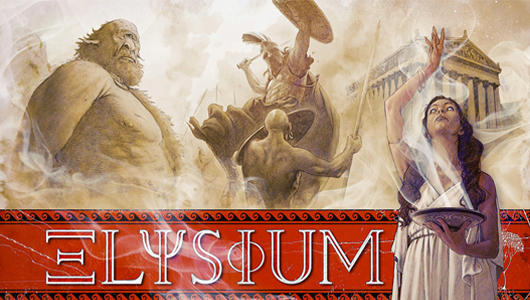

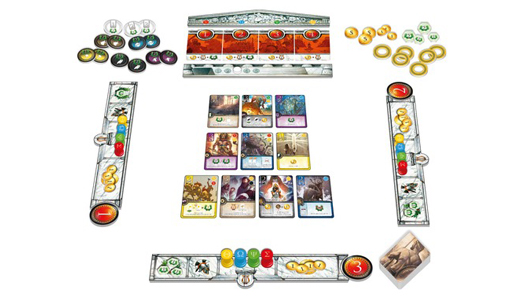
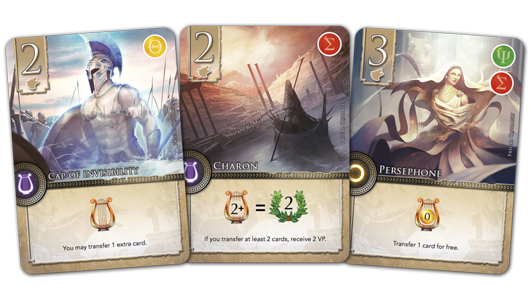
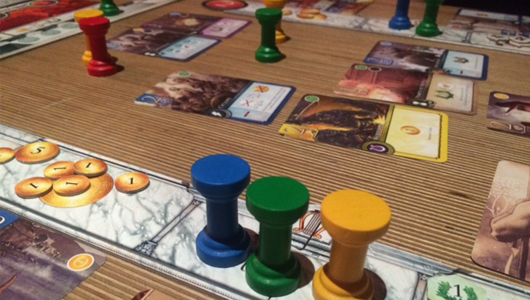
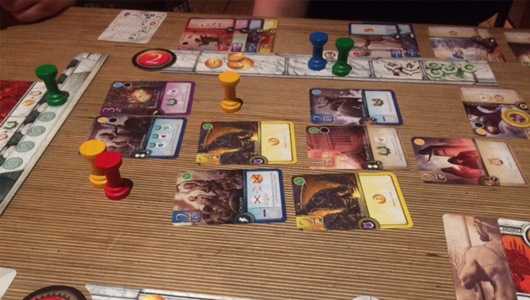
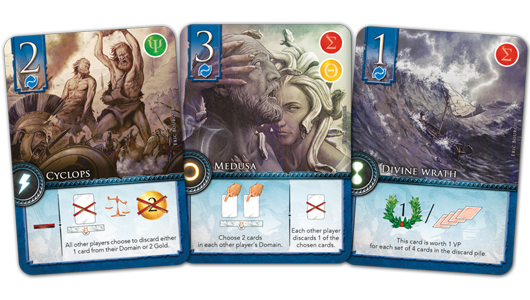
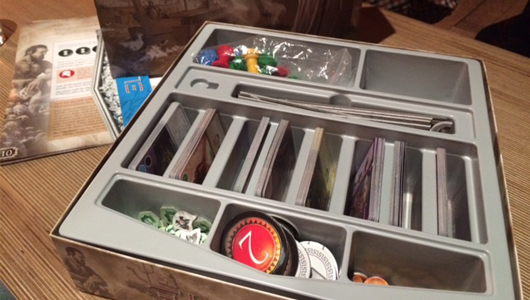

Hey Alex,
Thanks for the great review. One thing, though!
Your concern about turn order and action resolution, and the statement “The acquisition of cards comes first, then the card powers are resolved, then the quests are resolved and finally the transfer of cards from Domain to Elysium.” suggests that are not playing the main ‘Actions’ phase (Phase II) correctly.
It’s a little difficult to tell, of course, but certainly it is not the case that players acquire all their cards before having the opportunity to use any of them. On each turn, players may be able to use cards in their Domain, provided they are of the right type. There is no separate “card power resolution” phase!
Feel free to mail me if you have any questions! (Tim has has my email.)
All the best,
Brett